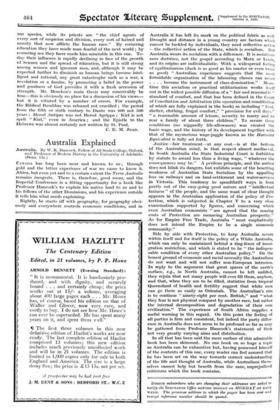Australia Explained
Australia. By W. K. Hancock, Fellow of All Souls College, Oxford, and Professor of Modern History in the University of Adelaide. (Henn. 15s.) CANADA has long been near and known to us ; through gold and the bitter experience of war we came to know S. Africa, but even yet and to a certain extent the Terra Australis remains incognita. There is, therefore, good room, and the Imperial Conference is a fitting opportunity for a book like Professor Hancock's to explain his native land to us and to his fellows of the other Dominions, and his experience outside It tells him what needs explaining.
Rightly, he starts off with geography, for geography obvi- ously and everywhere controls economic conditions, and in
Australia it has left its mark on the political fabric as well. Drought and distance in a young country are factors which cannot be tackled by individuals, they need collective action —the collective action of the State, which is socialism. But Australia wears its socialism with a difference. It is socialisme sans doctrines, not the gospel according to Marx or Lenin, and its origins are individualistic. With a widespread feeling of egalitarianism (Jack is as good as his master or even twice as good) "Australian experience suggests that the 'not formidable organization of the labouring classes can never . . . . become the instrument of class-domination." Mean- time this socialism or practical utilitarianism works itself out in the widest possible diffusion of a " fair and reasonable" standard of comfort, and that has been defined in the Court of Conciliation and Arbitration (the operation and constitution of which are fully explained in the book) as including" food, shelter, clothing, frugal comfort," "provision for evil days," "a reasonable amount of leisure, security to marry and to rear a family of about three children." To secure these conditions (no niggardly life-allowance) was created the basic wage, and the history of its development together with that of the mysterious wage-juggle known as the Harvester Equivalent is fully set forth.
Justice—fair treatment—at any cost—is at the bottom of the Australian mind, in that respect almost !mediaeval. In South Australia the State Industrial Court. is forbidden by statute to award less than a living wage, "whatever the consequences may be." A perilous principle, and the author does not blink its dangers, but exhibits some of the besetting weakness of Australian State Socialism by the appalling loss on railways and on land-settlement and water-services in Victoria. This tendency . to spendthrift ways is born partly out of the easy-going good nature and "intellectual laziness" of the people, and the same want of dear thought Appears in the Australian application of the policy. of Pro- tection, which is subjected in Chapter V to a very close examination supported by figures, and concerning whirl: even Australian economists "are agreed that the soaring costs of Protection are menacing Australian prosperity." As for Empire Free Trade, Australia "most emphatically does not intend the Empire to be a single economic community."
Side by side with Protection, to keep Australia secure within itself and for itself is the policy of a White Australia, which can only be maintained behind a ring-fence of immi- gration restriction, and which is stated to be "the indispen- sable condition of every other Australian policy." On the honest ground of economic and racial necessity the Australians -do not want and will not suffer non-European intrusion. -In reply to the argument that great spaces of the earth's surface, e.g., in North Australia, cannot be left unfilled, they rejoin that not many people will ever 811 them, anyhow, and that, when they are to be filled, statistics from tropical "Queensland of health and fertility suggest that white men can go there as easily as Orientals. The Australian's aim is to continue "ninety-eight per cent. British," and "what they fear is not physical conquest by another race, but rather the internal decomposition and degradation of their own civilization." The experience of South Africa supplies a useful warning in this regard. On this point the feeling of all parties is firm and consistent, but indeed the party differ- ence in Australia does not seem to be profound so far as may be gathered from Professor Hancock's statement of their not very greatly varying aims and -distribution.
In all that has been said the mere surface of this admirable book has been skimmed. No one book on so huge a topic as Australia can be exhaustive but, having possessed himself of the contents of this one, every reader can feel assured that he has been set on the way towards correct understanding of the life and thought of Australia, while Australians them- selves cannot help but benefit from the sane, unprejudiced criticisms which the book contains.




















































 Previous page
Previous page